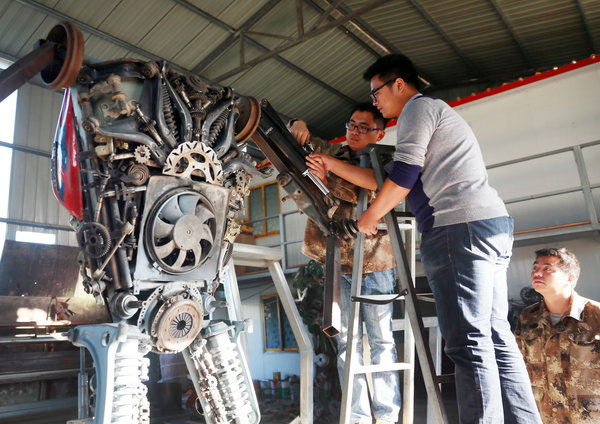Labor needs skills training to adapt to the age of robots
Updated: 2015-02-02 07:44
By Guy Ryder(China Daily)
|
||||||||
 |
|
The three "Transformers" fanatics inspect an unfinished sculpture. [Photo/CFP] |
Fears about the impact of technology on the labor market are nothing new. In the early 19th century, a group of English textile workers known as the Luddites worried that new technologies like power looms and spinning frames would cost them their jobs. They protested by smashing the machines. Today, anxiety that new technologies could destroy millions of jobs is as high as ever. In the midst of a major employment crisis, technology continues to reduce the labor needed for mass production, while the automation of routine legal and accounting tasks is hollowing out that sector of the job market as well.
The science of robotics is revolutionizing manufacturing; every year, an additional 200,000 industrial robots come into use. In 2015, the total is expected to reach 1.5 million. Adapting the labor market to a world of increasingly automated workplaces will be one of the defining challenges of our era.
Yet no country can afford to ignore the transformation. Globally, some 200 million people are unemployed, up 27 million since 2008. There is a critical need to anticipate coming technological changes and provide the global workforce with the education and skills needed to participate in the modern labor market.
Worldwide, one-third of employees surveyed complain that they are unable to find workers with the right skills for existing vacancies. Efficient paths from training and education programs to the world of work must be built, so that skills can be matched to market demand. Government programs must be strengthened, and employers and trade unions must assume greater responsibility for investing in skills. They also must consult more closely with educators and policymakers-discussions that should be informed by labor market information, performance reviews and the availability of employment services.
Whatever a country's development level, investment in education and skills will increase the ability of its workforce to innovate and adapt to new technologies. Such investment can determine whether a country's economic growth is broadly inclusive or leaves large segments of society behind. An abundant supply of workers who have been appropriately trained and can continue to learn boosts investor confidence and thus job growth.
- Global health entering new era: WHO chief
- Brazil's planning minister steps aside after recordings revelation
- Vietnam, US adopt joint statement on advancing comprehensive partnership
- European border closures 'inhumane': UN refugee agency
- Japan's foreign minister calls A-bombings extremely regrettable
- Fukushima impact unprecedented for oceans: US expert

 Stars of Lijiang River: Elderly brothers with white beards
Stars of Lijiang River: Elderly brothers with white beards
 Wealthy Chinese children paying money to learn British manners
Wealthy Chinese children paying money to learn British manners
 Military-style wedding: Fighter jets, grooms in dashing uniforms
Military-style wedding: Fighter jets, grooms in dashing uniforms
 Striking photos around the world: May 16 - May 22
Striking photos around the world: May 16 - May 22
 Robots help elderly in nursing home in east China
Robots help elderly in nursing home in east China
 Hanging in the air: Chongqing holds rescue drill
Hanging in the air: Chongqing holds rescue drill
 2.1-ton tofu finishes in two hours in central China
2.1-ton tofu finishes in two hours in central China
 Six things you may not know about Grain Buds
Six things you may not know about Grain Buds
Most Viewed
Editor's Picks

|

|

|

|

|

|
Today's Top News
Liang avoids jail in shooting death
China's finance minister addresses ratings downgrade
Duke alumni visit Chinese Embassy
Marriott unlikely to top Anbang offer for Starwood: Observers
Chinese biopharma debuts on Nasdaq
What ends Jeb Bush's White House hopes
Investigation for Nicolas's campaign
Will US-ASEAN meeting be good for region?
US Weekly

|

|







